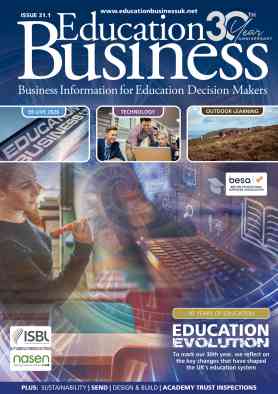
Modernising the computing curriculum
How should the computing curriculum be modernised to reflect current jobs? And how can schools attract a more diverse student pool to take the subject? Julia Adamson from BCS, The Chartered Institute for IT, shares some thoughts
As the digital world continues to evolve rapidly – so must the education system in order to successfully prepare young people for the future.
With the continued growth of Artificial Intelligence (AI) and other emerging technologies, it is clear that the current computing curriculum in schools needs a significant overhaul. It has proved to be unappealing and disengaging for many students.
Young people need a new digital literacy qualification focussed on AI and modern tech skills, as part of reform to the school curriculum.
BCS, The Chartered Institute for IT’s recent response* to the Department for Education’s (DfE) Curriculum and Assessment review stated that the current Computer Science GCSE works for just a narrow group of students, due to its theoretical focus.
The Institute’s analysis of DfE data found that 94 per cent of girls and 79 per cent of boys in England drop computing as soon as they can, at 14 years old. The lack of focus on practical outcomes puts a great many students off.
The scope of the existing GCSE should be broadened to include a focus on how AI is built, as well as its risks and opportunities – and do more to show teenagers the ways in which computing changes the world.
Unmotivating
The current computing curriculum is abstract and unmotivating. It doesn’t show teenagers how the subject can be applied to solve society’s big challenges.
Its focus on theory limits its appeal, especially among young people who are more interested in seeing how computing can solve real-world problems.
The key stage 3 curriculum and the GCSE need updating to reflect this and to include areas like AI – as well as an understanding of the huge social and economic impact of computing.
The lack of a universal digital literacy qualification is an issue in modern education. While literacy and numeracy are foundational skills assessed through national exams, digital literacy remains largely ignored at Key Stage 4. This oversight is concerning, as digital skills are now as vital to young people’s futures as reading and writing.
A more inclusive, cross-disciplinary approach to computing education would better reflect the reality of modern careers, where technology is integrated into every industry.
The introduction of a digital literacy qualification would also be an effective tool in addressing the digital divide that disproportionately impacts students from disadvantaged backgrounds.
Barriers to learning
A significant number of young people in the UK, particularly in areas of social deprivation, struggle with access to technology and the internet, creating barriers to learning. By ensuring that digital literacy is integrated into the curriculum, schools could offer more equitable opportunities for all students, regardless of their socioeconomic status.
Tackling gender and ethnic disparities will help engage a more diverse student pool. A major challenge in computing education today is the lack of diversity among students pursuing the subject. Gender disparities are particularly stark, with a significant gender gap in the number of girls opting for Computer Science at all levels – GCSE, A Level, T Level, apprenticeships and degrees.
A contextually relevant curriculum with opportunity for meaningful practical work is likely to be more appealing. The focus on technical aspects of computing often fails to universally appeal to the broad student cohort, who are more motivated by the potential for technology to make a positive social impact.
Research has shown that girls’ interest in computing increases when topics are presented in more socially relevant contexts. A curriculum that highlights how computing can be used to address global challenges, such as climate change, healthcare and social justice, could potentially inspire more girls to engage with the subject.
Students from disadvantaged or underrepresented ethnic backgrounds face additional barriers in accessing computing education. Schools in poorer areas are less likely to offer GCSE Computer Science, and students in these areas often lack the resources necessary to practice computing outside of school.
This digital poverty exacerbates existing inequalities and limits opportunities for these students to pursue careers in technology. Addressing this issue requires not only curriculum reform, but also targeted investment in resources and support for schools in disadvantaged areas.
Creating a path to digital literacy
Modernising the computing curriculum will help create a path to digital literacy and inclusion. It is essential that the computing curriculum reflects the technologies and skills that are shaping modern careers an increasingly digital world.
A broad, inclusive curriculum that incorporates practical skills around areas such as AI will ensure that all students – regardless of their background – leave school digitally literate and ready to thrive in the workforce. By addressing the gender, ethnic and socioeconomic disparities that exist in computing education, schools can help ensure that all young people have access to the opportunities of the digital age.
Students should be to equipped not only with technical expertise, but also with the critical thinking skills necessary to navigate the ethical and social implications of technology. With the right changes to the curriculum, schools can provide young people with the tools they need to succeed in a world increasingly reliant on digital technology.
Pupils should be taught for example, how to get the best out of tools like ChatGPT, Copilot or Gemini, understanding their strengths and limitations, so they can succeed in life and modern careers.
All young people deserve to leave school digitally literate – or they’ll be left behind. This needs to be recognised in a new qualification that proves this and gives employers, universities and training providers confidence.
It should go beyond low-level functional skills and include critical thinking about the opportunities and risks digital technology presents for the world.
*The research focussed on schools in England only, where the computer science GCSE is taught; BCS said other UK nations took a range different approaches to teaching information technology.
Latest News
29/01/2026 - 10:37
The Education Business Awards recognise the leadership, innovation, operational decisions and strategic planning that help schools run more effectively and deliver better environments for both staff and pupils.
29/01/2026 - 10:26
The Education and Work and Pensions Committees have launched a joint inquiry investigating how the Government’s new Child Poverty Strategy, announced last month, can meet its aims.
29/01/2026 - 09:23
Charity School Food Matters has released learnings from its school food improvement programme, Nourish, and has formed a roadmap to success for school food policy.
28/01/2026 - 09:57
Multi-academy trusts are increasingly turning to artificial intelligence to support teaching, learning and school management, but evidence of its impact remains limited, according to new research from the Education Policy Institute (EPI).
27/01/2026 - 10:04
The government is running a tender for industry to co-create AI tutoring tools with teachers, with the goal of bringing these tools to a similar level of quality of personalised one to one support.







